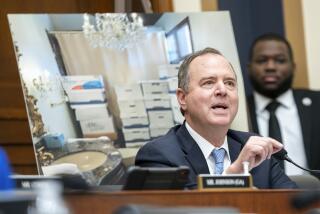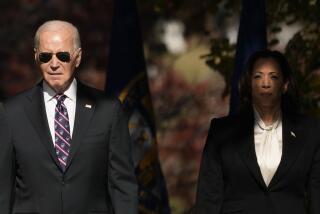Democrats embrace Occupy Wall Street as GOP strikes
The days of the Democratic Party keeping the Occupy Wall Street movement at arm’s length appear to be ending, even as Republicans continue to hammer away at the progressive protesters.
For a while, the Democratic establishment appeared to view the protests as something of a crazy relative. But Monday, the party’s House campaign arm made it clear that it stood shoulder-to-shoulder with the movement.
In an email to supporters, Robby Mook, executive director of the Democratic Congressional Campaign Committee, wrote: “Protestors are assembling in New York and around the country to let billionaires, big oil and big bankers know that we’re not going to let the richest 1% force draconian economic policies and massive cuts to crucial programs on Main Street Americans.”
The missive slapped House Majority Leader Eric Cantor (R-Va.) for using the word “mobs” to describe the protestors.
“That’s what Republicans refer to as the middle class, or maybe the millions of unemployed Americans across the country,” Mook wrote.
The email asks the recipient to sign a petition in support of the protests, signifying that a sea change of sorts regarding the establishment view of the movement seems to have occurred in the last few days.
First Vice President Joe Biden and then President Obama signaled they sympathized with the movement. Then, House Democratic Leader Nancy Pelosi gave it a full-on embrace Sunday. “I support the message to the establishment, whether it’s Wall Street or the political establishment and the rest, that change has to happen,” she said on ABC’s “This Week.” “We cannot continue in a way that does not — that is not relevant to their lives. People are angry.”
The endorsement of the movement tracks the newfound emphasis the Democrats are placing on economic inequality as Obama readies a push for his American Jobs Act. Various proposals have been offered by the White House and the Senate involving increasing taxes on wealthier Americans. And in travels across the nation, the president has been eager to place the GOP on the side of big business and billionaires.
For their part, Republicans have argued that the protests are a natural occurrence of what they see as Obama’s denigration of the wealthy.
At a town hall in New Hampshire on Monday, GOP presidential candidate Mitt Romney said the movement was born of people “seeking scapegoats.”
According to the Hill newspaper, Romney said, “Don’t attack a whole class of Americans, whether they’re rich or poor, white or black. This isn’t the time for divisiveness.”
On Sunday, Rep. Paul D. Ryan (R-Wis.), chairman of the House Budget Committee, accused Obama of “sowing” class envy.
“I think the president is doing that. I think he’s preying on the emotions of fear, envy and anger. And that is not constructive to unifying America. I think he’s broken his promise as a uniter, and now he’s dividing people. And to me, that’s very unproductive. That’s not who we are in America.”
Ryan pushed back at the suggestion that the GOP is only interested in supporting the rich and powerful in America.
“Well, people make the charge. What I would simply say is I don’t worry about people who are already rich,” Ryan said. “I’m worried about getting people to become successful, removing those barriers so that people who’ve never seen success before can actually become successful. And when you keep raising all these tax rates, all these regulatory barriers on successful small businesses, how are we gonna get the jobs of tomorrow?”
For the Occupy Wall Street movement, the eagerness with which some Democrats appear to be aligning themselves with its goals brings with it a certain degree of risk.
The movement has, right or wrongly, been frequently compared to the rise of the tea party (some are calling it the “left-tea party”), which also began as a backlash against the Wall Street bailouts.
Like the Wall Street protestors, the tea party in those early days described itself as lacking central organization—and its proponents feared being co-opted by a then-flagging GOP that was eager for a new identity. They worried that being identified too closely with the Republican agenda would lessen its credibility.
Some Republicans such as presidential contender Herman Cain have suggested that the Democratic Party infrastructure has been behind the protests all along, claiming Sunday that labor unions have driven the movement so as to distract the public from Obama’s economic policies.
Those same suspicions trailed the tea party as well, that the movement was a product of special interest groups and conservative financiers such as the Koch brothers.
Amy Kremer, chair of the advocacy group Tea Party Express, downplayed the comparison in an interview Monday with “The Takeaway,” a public radio program based in New York.
“I understand why they’re out there. I understand why they’re mad at Wall Street — that the banks were bailed out. But you know, we were mad that the banks were bailed out too; that’s one of the reasons we got started. But we certainly weren’t out in the street for four weeks. At some point you have to turn,” Kremer said. “Having a protest attracts people to the movement, but at some point if you want to be effective, you have to do something to effect change. And being in the streets for a month isn’t going to effect change.”
But when asked about the dangers of being identified too strongly with the GOP, Kremer seemed to suggest some common ground with the protestors on the other side of the spectrum.
“Everyone wants to align us with the Republican Party, and yes, we do align more with conservative values. But this is not about being Republican or being Democrat, this is about being American,” she said. “And what we want people to do is to educate themselves on the issues so when they go to the polls, they vote on the issues and not on the letter next to someone’s name.”
james.oliphant@latimes.com
More to Read
Start your day right
Sign up for Essential California for news, features and recommendations from the L.A. Times and beyond in your inbox six days a week.
You may occasionally receive promotional content from the Los Angeles Times.






